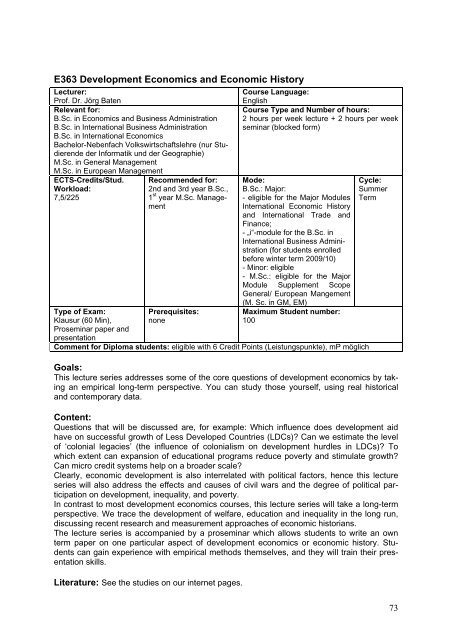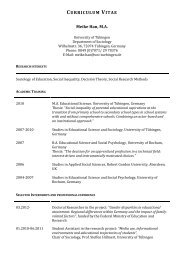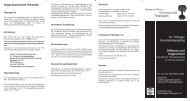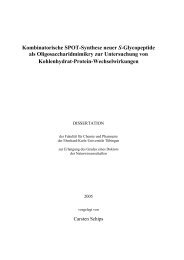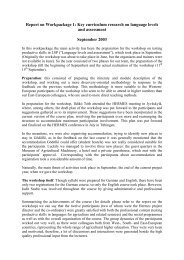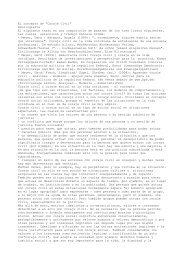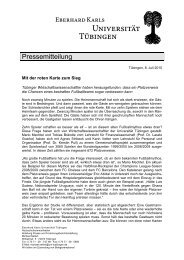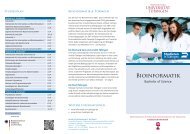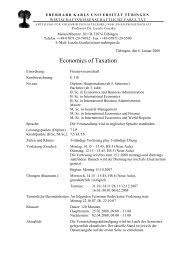Modulhandbuch Wirtschaftswissenschaft - Universität Tübingen
Modulhandbuch Wirtschaftswissenschaft - Universität Tübingen
Modulhandbuch Wirtschaftswissenschaft - Universität Tübingen
Sie wollen auch ein ePaper? Erhöhen Sie die Reichweite Ihrer Titel.
YUMPU macht aus Druck-PDFs automatisch weboptimierte ePaper, die Google liebt.
E363 Development Economics and Economic History<br />
Lecturer:<br />
Prof. Dr. Jörg Baten<br />
Relevant for:<br />
B.Sc. in Economics and Business Administration<br />
B.Sc. in International Business Administration<br />
B.Sc. in International Economics<br />
Bachelor-Nebenfach Volkswirtschaftslehre (nur Studierende<br />
der Informatik und der Geographie)<br />
M.Sc. in General Management<br />
M.Sc. in European Management<br />
ECTS-Credits/Stud. Recommended for:<br />
Workload:<br />
2nd and 3rd year B.Sc.,<br />
7,5/225<br />
1 st year M.Sc. Management<br />
Type of Exam:<br />
Klausur (60 Min),<br />
Proseminar paper and<br />
presentation<br />
Prerequisites:<br />
none<br />
Course Language:<br />
English<br />
Course Type and Number of hours:<br />
2 hours per week lecture + 2 hours per week<br />
seminar (blocked form)<br />
Mode:<br />
B.Sc.: Major:<br />
- eligible for the Major Modules<br />
International Economic History<br />
and International Trade and<br />
Finance;<br />
- „i“-module for the B.Sc. in<br />
International Business Administration<br />
(for students enrolled<br />
before winter term 2009/10)<br />
- Minor: eligible<br />
- M.Sc.: eligible for the Major<br />
Module Supplement Scope<br />
General/ European Mangement<br />
(M. Sc. in GM, EM)<br />
Maximum Student number:<br />
100<br />
Comment for Diploma students: eligible with 6 Credit Points (Leistungspunkte), mP möglich<br />
Cycle:<br />
Summer<br />
Term<br />
Goals:<br />
This lecture series addresses some of the core questions of development economics by taking<br />
an empirical long-term perspective. You can study those yourself, using real historical<br />
and contemporary data.<br />
Content:<br />
Questions that will be discussed are, for example: Which influence does development aid<br />
have on successful growth of Less Developed Countries (LDCs)? Can we estimate the level<br />
of ‘colonial legacies’ (the influence of colonialism on development hurdles in LDCs)? To<br />
which extent can expansion of educational programs reduce poverty and stimulate growth?<br />
Can micro credit systems help on a broader scale?<br />
Clearly, economic development is also interrelated with political factors, hence this lecture<br />
series will also address the effects and causes of civil wars and the degree of political participation<br />
on development, inequality, and poverty.<br />
In contrast to most development economics courses, this lecture series will take a long-term<br />
perspective. We trace the development of welfare, education and inequality in the long run,<br />
discussing recent research and measurement approaches of economic historians.<br />
The lecture series is accompanied by a proseminar which allows students to write an own<br />
term paper on one particular aspect of development economics or economic history. Students<br />
can gain experience with empirical methods themselves, and they will train their presentation<br />
skills.<br />
Literature: See the studies on our internet pages.<br />
73


